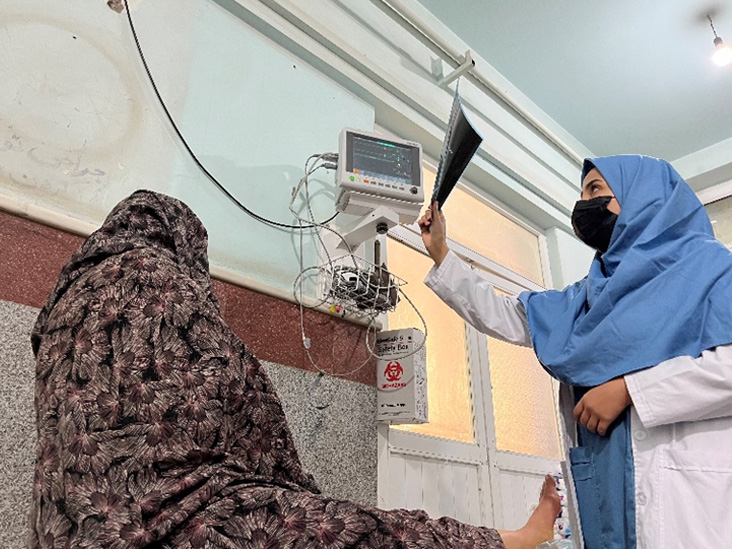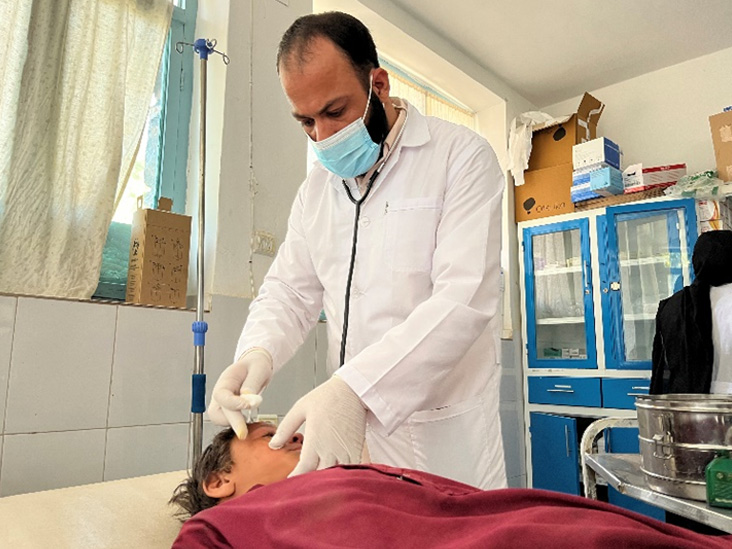 20 November 2024, Kabul, Afghanistan – In response to gaps in standardized trauma management in western Afghanistan, the World Health Organization (WHO) trained 48 first contact health care workers, half of them women, in basic emergency care (BEC) in Herat province.
20 November 2024, Kabul, Afghanistan – In response to gaps in standardized trauma management in western Afghanistan, the World Health Organization (WHO) trained 48 first contact health care workers, half of them women, in basic emergency care (BEC) in Herat province.
Since January 2024, WHO has trained 339 health workers in BEC, 154 of them women, across Afghanistan.
The trained health workers include doctors, gynaecologists, nurses and midwives who care for patients with acute illnesses or injury.
BEC requires a systematic approach to the initial assessment and management of time-sensitive conditions such as injuries, infections, noncommunicable diseases, including mental health conditions, and acute complications of pregnancy. It is relevant to many health workers, including nurses, ambulance providers and doctors, and in a range of settings, including humanitarian crises.
For Dr Hamidullah Atayi and Hasiba Zahedi, participants in the most recent round of BEC training in November, the training has boosted their confidence in managing trauma cases.
Dr Atayi, 31, is a general practitioner at Pashtun Zarghun Comprehensive Health Care Plus (CHC+), located 65 km from the provincial centre of Herat. He has been working in the health centre for 4 years and regularly receives emergency cases, including myocardial infraction, allergies, trauma and acute watery diarrhoea with dehydration in children.
“It is very challenging to manage emergency cases when medical staff and medical supplies are limited,” said Dr Atayi. “But with the new skill set that I gained during the BEC training I am much more confident in my medical practices. The training was very effective in helping us diagnose types of emergency and determine appropriate treatment.”
 Dr Atayi recognizes that skilled first contact health care workers are crucial for effective initial management of trauma patients: “BEC training is critical because emergency patients require specialized treatment. They need maximum care in a very short period to save their lives. Skilled first contact staff have a higher chance of managing emergencies effectively and reducing mortality rates among severely injured or ill patients.”
Dr Atayi recognizes that skilled first contact health care workers are crucial for effective initial management of trauma patients: “BEC training is critical because emergency patients require specialized treatment. They need maximum care in a very short period to save their lives. Skilled first contact staff have a higher chance of managing emergencies effectively and reducing mortality rates among severely injured or ill patients.”
Hasiba Zehidi, 23, is in her second year as a nurse in the women’s section of the neurosurgery department at Herat’s 650-bed regional hospital. The types of emergencies she deals with include brain haemorrhages, bruises, herniated discs, brain tumours and hydrocephalus.
In Zahedi’s experience, female patients and their families are more comfortable with women doctors and nurses, making BCE training vital for female health workers in emergency settings.
“The training was very useful. BEC skills are very important for increasing patients’ chances of survival as well as our own and others’ safety,” she explained, highlighting the impact of the training on her work.
“In a traditional society like Afghanistan, men generally don’t provide first aid to women because of religious considerations. Training female staff in BEC will benefit families and the wider society.”
WHO supports building national capacity in trauma care, strengthening service delivery, developing contingency and mass casualty management plans and conducting simulation exercises in Afghanistan.
“Afghanistan is experiencing a protracted emergency and a widespread and complex humanitarian crisis and has a history of recurrent natural and human disasters, making trauma care support a priority for WHO and its partners,” said WHO Representative to Afghanistan Dr Edwin Ceniza Salvador.
“Trauma and emergency training is instrumental in ensuring availability of skilled frontline health workers to improve the chances of survival and recovery for patients seeking lifesaving support.”


